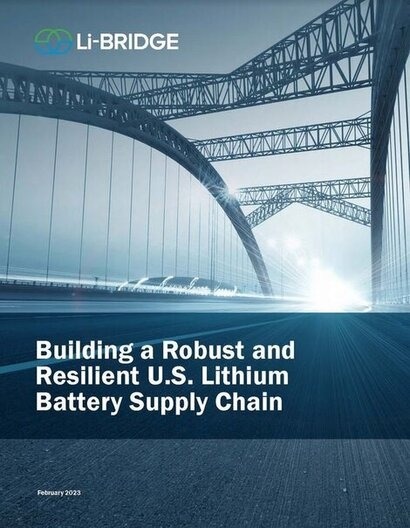
The Li-Bridge report - “Building a Robust and Resilient US Lithium Battery Supply Chain” - includes 26 recommended actions to bolster the domestic lithium battery industry. Underscoring the need to stabilise policy and spur investment, key recommendations in the report include a buying consortium for raw energy materials, a system of shared pilot lines to speed the commercialisation of new battery technologies, significant additional investment in battery industry workforce training, and permitting reform.
“As the Li-Bridge facilitator between private industry and the Federal Consortium for Advanced Batteries, Argonne believes adoption of the report’s recommended actions can set the nation on a path for battery manufacturing and supply chain success” said Argonne Laboratory Director Paul Kearns
The report complements a series of recent government initiatives designed to strengthen the country’s battery and semiconductor industries including the Inflation Reduction Act (IRA), the Infrastructure Investment and Jobs Act (known as the Bipartisan Infrastructure Law or BIL) and the CHIPS and Science Act, which together represent some of the most significant industrial policy initiatives in US history.
“The Biden-Harris administration investments in battery manufacturing and supply chain have set our country on a path towards a transportation system that provides cleaner and more accessible mobility options, provides good-paying jobs for American workers, and secures our national energy independence,” added Deputy US Energy Secretary David M. Turk. “The public-private partnerships described in this report will be crucial to realizing that safer, cleaner future that will benefit generations of Americans to come.”
Announced in October 2021 by DOE and Argonne, Li-Bridge is spearheaded by three industry trade groups — NAATBatt International, the New York Battery and Energy Storage Technology (NY-BESTTM) Consortium, and New Energy Nexus — with active involvement from DOE national labs and Boston Consulting Group. The first collaboration of its kind in the US battery industry, Li-Bridge’s report is a result of collaboration of more than 40 companies, spanning market leaders and startups across the automotive, advanced battery, mining and chemical, and electric utility sectors. Those organisations collectively employ more than 1.2 million people and generate approximately $900 billion in annual revenues.
“This report provides key insights and solutions toward the goal of establishing a resilient domestic manufacturing base and supply chain for batteries, summarising in-depth discussions between private industry, DOE’s national labs, and federal partners” said Argonne Laboratory Director Paul Kearns. “As the Li-Bridge facilitator between private industry and the Federal Consortium for Advanced Batteries, Argonne believes adoption of the report’s recommended actions can set the nation on a path for battery manufacturing and supply chain success.”
Fueled by exponential demand, lithium-based batteries and the devices they power are major contributors to economic growth in the 21st century on par with semiconductors. According to the report, if the US cannot establish a secure and stable supply chain for lithium battery technology within its borders, other countries will enjoy the economic growth and job creation that lithium battery technology will create. Today, about 76 percent of lithium battery cells and the large majority of cell components are made in China.
Lithium-based batteries are also critical for achieving US climate objectives. The report states that without reliable access to lithium battery technology, the US has no chance of meeting its 2050 net-zero carbon emissions goal or ensuring an inclusive and socially responsible industry. With US defense applications increasingly dependent on lithium-based batteries, the report warns of the national security risks in relying on batteries and battery components made abroad.
According to the report, the US will not achieve complete lithium battery supply chain independence by 2030, but it estimates the country can capture 60 percent of the economic value consumed by domestic demand for lithium batteries by that year, generating $33 billion in revenues and creating 100,000 jobs.
For additional information:

